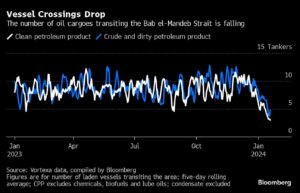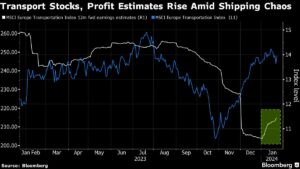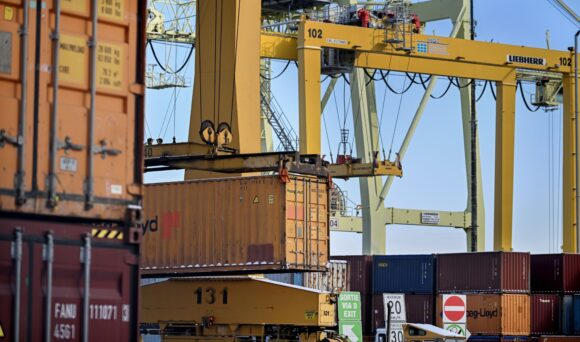With the Red Sea crisis roiling shipments of everything from cars to energy, it’s a matter of time before soaring costs and supply-chain strains show up in companies’ earnings reports.
Several firms are already warning of the impact. Electric-vehicle maker Tesla Inc. plans a two-week production halt at a German plant due shipment delays, while Sweden’s Volvocar AB has announced a three-day stoppage at its Belgian factory. British retailers Tesco Plc, Marks & Spencer Group Plc and Next Plc have all flagged the risk of higher prices for consumers.
All that’s because at least 2,300 ships are taking lengthy detours to avoid Houthi militants’ attacks in the Red Sea — a waterway that normally handles over 12% of global sea trade. Central bankers are warning of an inflation surge that could hamper interest-rate cuts. For many companies, especially in Europe, it’s adding to transit times, padding out freight bills and raising insurance costs. And it’s forcing analysts to re-think companies’ earnings estimates for the coming year.
 In the past three months, the consensus forecast for car-makers’ earnings is down 5%, data compiled by Bloomberg shows. Shippers on the other hand are emerging winners — with container rates surging 300% on some routes, earnings estimates for MSCI Europe’s transportation index have risen 7% in just two weeks.
In the past three months, the consensus forecast for car-makers’ earnings is down 5%, data compiled by Bloomberg shows. Shippers on the other hand are emerging winners — with container rates surging 300% on some routes, earnings estimates for MSCI Europe’s transportation index have risen 7% in just two weeks.
Transport Stocks, Profit Estimates Rise Amid Shipping Chaos
How Houthi Red Sea Attacks Are Disrupting World Trade: QuickTake
Thomas Brenier, head of equities at Lazard Freres Gestion in Paris, has trimmed exposure to the auto sector, seeing it as “one of the first to suffer due to its complex and tense supply chain.” He is also avoiding retail, as it “could suffer from a lack of products to sell.”
“If it lasts another one or two months, for sure you will see some profit warnings linked to this,” Brenier predicted.
Here’s a look at how earnings could shape up for various sectors:
Shipping and Insurance
Current container shipping costs, if sustained, could add to headline inflation in the UK and euro area from late 2024 and early 2025, Bloomberg Intelligence estimates.
But the events are boosting the fortunes of global shipping companies, such as AP Moller- Maersk A/S and Hapag-Lloyd AG in Europe, US-listed ZIM Integrated Shipping and Japan’s Mitsui OSK Lines Ltd. Insurers should also benefit, with underwriters jacking up premia tenfold on some shipping routes.
Among shippers, Maersk has enjoyed a slew of bullish recommendations. Bank of America recently doubled 2024 earnings estimates for the Danish firm, while Goldman Sachs Group Inc. reckons a massive increase in free-cash flow could allow it to return capital to shareholders.
David Vernon at Sanford C Bernstein and Co. predicts an earnings boost for logistics firms too, including freight forwarders, if companies that run out of shipping options resort to airfreight.
“Air freight are absolutely the winners,” Vernon said, naming FedEx Corp., United Parcel Service Inc. and DHL Group as potential beneficiaries.
Retailers
 Next, which sources most of its fashion and home products from Asia, was among the first retailers to voice fears of a hit.
Next, which sources most of its fashion and home products from Asia, was among the first retailers to voice fears of a hit.
Primark, which is owned by Associated British Foods Plc, and Hennes & Mauritz AB are highly exposed to sea-freight volumes, according to RBC Capital Markets analyst Richard Chamberlain, while Zara-owner Inditex SA sources mostly from nearby countries. Similarly, Bryan Garnier & Co. highlights French furniture retailer Maisons du Monde SA as highly vulnerable, procuring 75% of its goods from Asia and transporting 90% by sea.
Prolonged disruption will pull in global brands such as Nike Inc., Adidas AG and Capri Holdings Ltd, Bernstein said.
The problem for such companies is that the economic backdrop can make it harder to pass higher costs to consumers. “Companies may have to absorb them, which would crimp profit margins,” Frédérique Carrier at RBC Wealth Management said.
Autos
So far, Tesla and Volvo Car are the only auto makers to announce production stoppages. But such delays “may represent a fresh risk to light vehicle production this year,” according to Morgan Stanley.
However, most reckon the industry won’t see a repeat of Covid-era problems. “Costlier fuel, extra days of space rented, and higher shipping rates are going to be a negative on companies’ P&Ls, but, putting this in perspective, transportation costs are about 57% lower than Covid levels,” BofA analyst John Murphy wrote.
The crisis could even allow automakers to maintain higher vehicle prices, Bloomberg Intelligence said.
Energy
The impact on crude prices has been relatively muted this year, but that could change if a prolonged conflict causes supply shortfalls.
However, oil markets are bracing for weeks-long disruptions. Fewer tankers are traversing the Bab el-Mandeb strait at the southern end of the Red Sea, according to Vortexa data compiled by Bloomberg. The number of ships carrying crude or dirty petroleum products such as fuel oil, have slid by 25% this year up to Jan. 19 verus a year earlier, the figures show.
Was this article valuable?
Here are more articles you may enjoy.


 Live Nation Monopoly Has ‘Broken’ US Concert Market, DOJ Says
Live Nation Monopoly Has ‘Broken’ US Concert Market, DOJ Says  Building Fortification And The Role of The Insurance Industry
Building Fortification And The Role of The Insurance Industry  Claims Handling Breakdowns From LA Wildfires One Year on
Claims Handling Breakdowns From LA Wildfires One Year on  Besieged Berkshire Utility Tries to Rewrite Who Pays for Wildfires
Besieged Berkshire Utility Tries to Rewrite Who Pays for Wildfires 